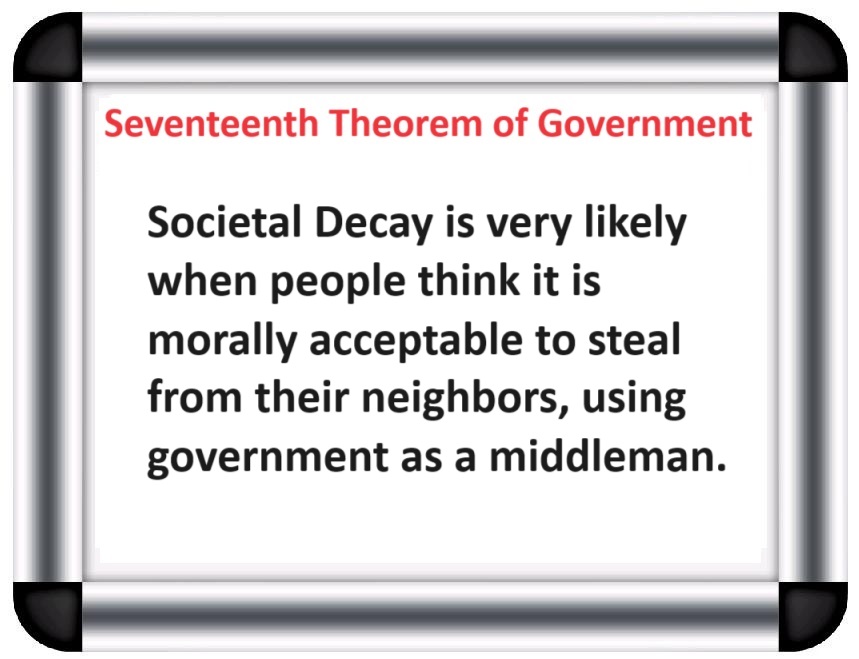I released my First Theorem of Government in 2015 and today I’m going to unveil the 17th iteration in the series.
But I’ll confess upfront that I’m doing a bit of recycling. My latest Theorem is very similar to something I shared back in 2014.
I decided to upgrade my 2014 column to a Theorem because of a story in the New York Times.
Authored by Suhasini Raj and , it discusses how India’s government is engaged in naked bribery.
…handouts are among the most distinctive parts of Mr. Modi’s mass appeal. …Mr. Modi’s party is organized to make the most of them in the national election that ends early next month. …India’s welfare programs are vast in reach and scope. Under the biggest, 821 million Indians are entitled to five-kilogram (11-pound) sacks of free rice or wheat every month.
The government …has…committed $142 billion to the program. Mr. Modi’s face began appearing on the sacks in January. …These transfers grew to $76 billion in the last fiscal year. …In a country where 80 percent of the population is either rural or poor, people are dead serious about getting something in exchange for their votes… Mr. Modi…told party workers to gather information about voters who had not received their benefits and to “assure them that it’s the Modi guarantee — they will get it in my third term.”
This is the bad part of democracy – two wolves and a sheep voting what to have for lunch.
And it can lead to very bad fiscal outcomes if the sheep decide to leave.
Which is a point made in a column for the Wall Street Journal by Sadanand Dhume. He also shares the very depressing observation that the upcoming election will be a contest between two parties that want more dependency.
Indeed, the Congress Party promises even more goodies than Modi’s BJP party.
If you get queasy seeing politicians try to buy voters with promises of freebies, avert your eyes from India’s current elections. Handouts dominate the economic message of both the ruling Bharatiya Janata Party and the opposition Congress Party. …no Indian politician is willing to point out hard economic truths—such as that an estimated 0.3% of people pay 80% of income taxes, or that at least 30,000 millionaires have left India since 2016 for friendlier climes.
…Congress’s redistributionist fantasy goes much further than promising every poor woman a monthly stipend. The party’s platform…promises, among other things, to double the amount of free grain the federal government provides poor families, immediately hire three million new government workers… The alternative to this subcontinental Hugo Chávez isn’t exactly an Indian Margaret Thatcher. The BJP platform emphasizes the party’s record of delivering handouts to the poor and “Modi’s guarantee” that this will continue. …Finance Minister Nirmala Sitharaman proudly imposed steep new taxes on the so-called superrich.
No wonder rich Indians are escaping. There’s academic evidence that government already is far too big in India and both parties want to make a bad situation even worse.
I’ll close with the general observation that policy in India today is better than it was 40 years ago.
That’s the good news. The bad news is that policy has been drifting in the wrong direction in recent years.
P.S. The government in India has some very unconventional freebies and some very perverse freebies.
P.P.S. India’s war on cash has produced predictably bad results.
P.P.P.S. India’s government schools are so terrible that private schooling is now ubiquitous.
